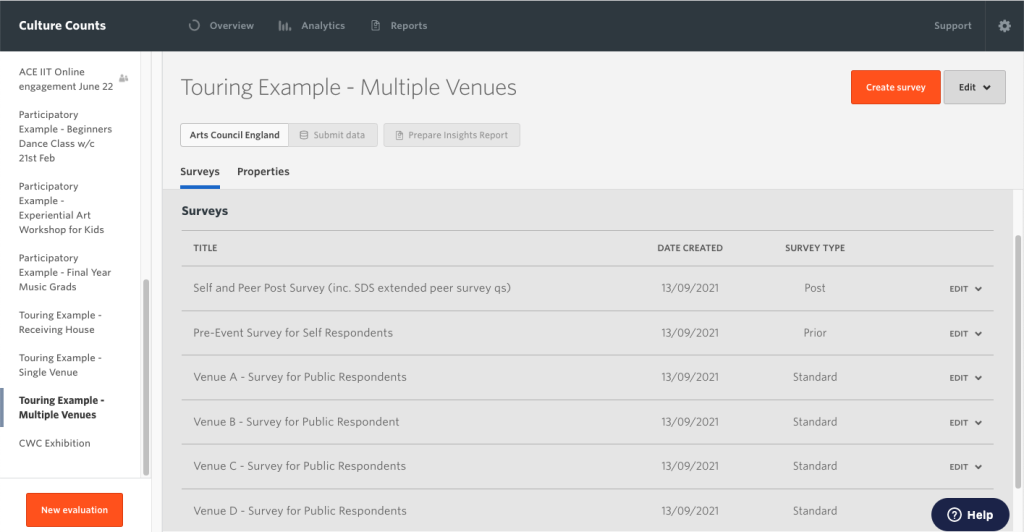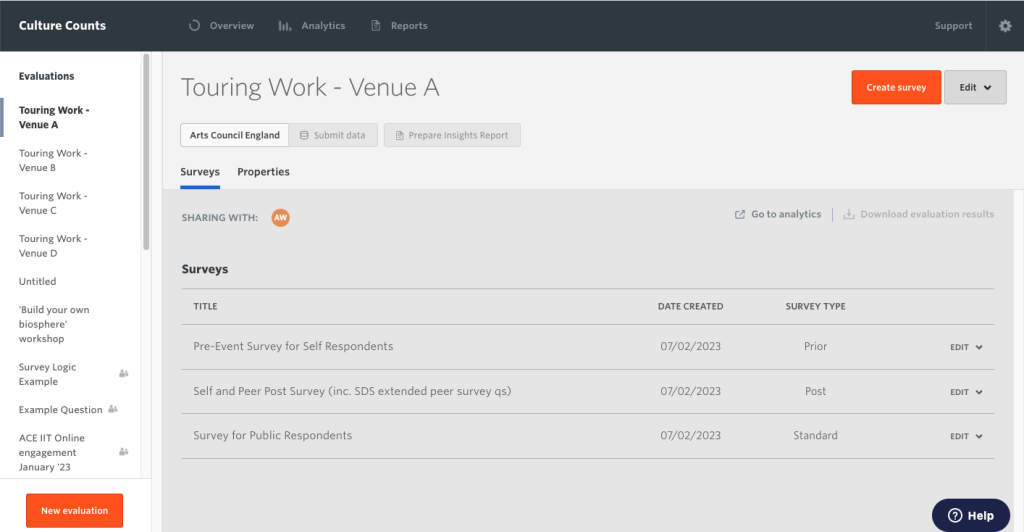1. Introduction
Using a standardised evaluation platform, like the Impact & Insight Toolkit (Toolkit), presents complexities for touring companies and receiving houses. We worked with Katy Raines from Indigo-Ltd on this guidance, following a touring pilot project she ran using the Toolkit, to address these challenges.
2. How to structure your evaluation
Use one evaluation across a whole tour
Within a standard Toolkit evaluation there are generally three surveys: 1 x self prior survey; 1 x self and peer post survey; 1 x standard public survey. When evaluating a tour within one evaluation, there are two different ways you can choose to structure it:
- Create separate public survey for each location e.g.: 1 x self prior survey; 1 x self and peer post survey; 1 x standard public survey (Venue A); 1 x standard public survey (Venue B); 1 x standard public survey (Venue C). This way, you can both analyse public data from individual locations and look at the data collectively. It also allows for the data to easily be divided up and each venue granted access to the appropriate public survey.

- Use one public survey across all locations e.g.: 1 x self prior survey; 1 x self and peer post survey; 1 x standard public survey. If the likelihood of gathering data from every location on a tour is unlikely, you just want to look at the overall impact of the touring work, or you’re not intending to share the data with individual venues, use a single public survey across all locations. If you still want to capture information about the location, you could combine this option with a dropdown question asking, ‘Where did you experience this work?’. However, if you did then want to share public responses with individual venues, you would need to manually separate the data.
Use separate evaluations for each tour location
You may have different intentions or expectations for the work at different venues. If this is the case, you may wish to create separate evaluations for each venue e.g. Touring Work – Venue A, Touring Work – Venue B.

Each evaluation would include standard Toolkit surveys: 1 x self prior survey; 1 x self and peer post survey; 1 x standard public survey. When using this structure, you may wish to invite self-assessors from the venue, in addition to internal staff members.
3. Working with receiving houses
Survey distribution
As a touring company, you may not have access to attendees’ email addresses. If this is the case, you can ask the receiving house to distribute your survey for you.
When asking a receiving house to send a survey, consider offering to share the data collected with them. If the receiving house accepts, they will receive valuable feedback without having to go through the process of setting up an evaluation themselves.
If a receiving house declines to distribute surveys for you, consider other ways to collect audience data. For example, you could use the interview delivery method, include a QR code to the survey on the programme/marketing material or share a link to the survey on social media.
Combining post-event surveys
The receiving house may be intending to send their own survey and, dependent on the questions they plan to include, the surveys could be combined. Before combining your surveys, check:
- What kind of questions they will be asking.
- If there is any overlap between what both organisations want to ask.
Sharing evaluations, surveys and data
If the receiving house is also an Impact & Insight Toolkit user, you can share evaluations, surveys and the associated data with them through the Culture Counts platform.
If they are not a Toolkit user, you may need to email them a list of survey questions in a spreadsheet or text document. Data would need to be manually downloaded from the platform and the file shared via email.
Data Protection
When personal data is being collected, such as the 6-digit postcode in the standard Toolkit survey, the General Data Protection Regulation (GDPR) and the UK’s 2018 Data Protection Act need to be complied with.
Between the receiving house and the touring company, it needs to be determined:
- Who is collecting the data?
- What data is being collected?
- Who is the data being shared with?
- Why is the data being shared – for what purpose?
The Data Protection Officer (DPO) at the receiving house will need to feel satisfied that there is ‘legitimate interest’ from the touring company. The DPO will also need to have ensured that there is provision either in their privacy policy or in direct communication with the respondent regarding data sharing with an identified third party. If sending out the survey via email from a CRM or box office, this could be as simple as stating in the body of the text that the results of the survey will be shared with the touring company so that both organisations can develop their practice and programmes in accordance with audience feedback. We would also recommend adding this in the ‘Introduction’ text box on the configure page. This way, even if they missed it in the body of the email, there will be another opportunity for them to receive this information. It is, of course, entirely up to that person if they choose to continue with completing the survey or not.
It’s also worth including that:
- Taking part in the survey is optional
- No personal data will be shared or used to contact them as a result of giving feedback
Refer to our general Data Protection guidance for further information.
4. Best practice
The purpose of collecting and sharing survey data for touring companies and venues should be discussed at contractual stage, and clearly understood by both parties.
There are huge benefits in the venue and visiting company ‘aligning’ their objectives for a piece of work or tour, so that both parties can ensure they get the greatest value out of the survey.
Being clear about this from the outset and ensuring this is encapsulated in the data sharing agreement, should have maximum benefits for both parties.
Checklist for receiving houses
- Privacy policy outlines uses of data collected at point of sale, to include customer surveys.
- Point of sale notification regarding data collection is clear regarding potential uses of data (including surveys).
- Privacy policy includes sharing survey findings with artistic partners and funders.
- Data sharing agreement setting out how personal and insight data will be shared between venue and touring company.
Checklist for touring companies
- Privacy policy includes personal and insight data received from venues and how it will be processed; include retention policy (i.e. how long data will be kept).
- Data sharing agreement setting out how personal and insight data will be shared between venue and touring company.
Please do get in touch with us if you would like to know more. There is also a wealth of information on the Information Commissioner’s Officer (ICO) website.